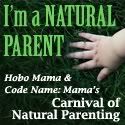Since I last blogged we've moved house and I've reached the latter stages of NCT breastfeeding counselling training. With any luck, I'll get the last few assignments done before Christmas and I'll be officially up and running by early next year. Maybe I'll write more about that some time... it might be useful for anyone considering NCT training. I thought I was already quite a complete, self-aware person, but the reflection and counselling skills training has taken me even deeper. I can step out of situations more now, and analyse more objectively why I react to things in the way I do.
So, another baby! I wrote a lot on this blog about my journey back to fertility. My periods restarted when Cave Baby I (now Cave Girl?) turned two. I had made no obvious change to our nursing habits. We immediately started trying to conceive, but after a couple of months I became frustrated at our lack of success. I seemed to have a short luteal phase and I took vitamin b6 and agnus castus (vitex) to improve it. There was no appreciable effect and I felt that my only option was to cut down on our still-frequent nursing sessions. I began by spacing sessions out to no more than four hourly. After another couple of months, I took what I considered to be the drastic step of cutting out all sessions other than morning and nap time and reducing sessions to 15 minutes. This might still sound like a lot of nursing to other people, but my daughter was a super keen breastfeeder! Even at two years old she would happily suck away for an hour in the morning. I am happy to say that the sudden drop in breast stimulation worked, and that very month I fell pregnant. I continued to breastfeed my eldest throughout the pregnancy despite my milk drying up by nine weeks (That was how keen Girl I was on feeding!). Nursing was annoying and a bit sore, but hey. I could take a bit of pain if it meant a quiet nap with my daughter in the afternoon :)
So fast forward nine months and my beautiful baby girl was born at home in a birthing pool with no complications. I tandem fed for three months but, by this time, I honestly felt that my eldest would be fine without it. Sleeping separately (me with newborn, Cave Father with eldest) had broken Girl I's association between feeding and sleep, and she had spontaneously dropped her naps when she had turned three. I felt like my breasts were becoming something of a battle ground, as a way for Girl I to assert her ownership over me. I was starting to resent her feeding and as a result I was finding the sensation of her suckling intolerable. There comes a time when it is in the interests of the family to draw breastfeeding to a close. Our time had come. She asked for the breast occasionally over the few days after I decided to wean, but was always satisfied with an explanation that it was time to stop. There were no tears - she truly had moved on emotionally from breastfeeding. At this time she needed my attention and love, and whilst feeding had been one way to meet these needs, other ways had become easier and more fulfilling for us both.
So here I am now, with an independently minded, highly spirited and still highly demanding almost-four year old and a sweet, smiley, relaxed baby. Who would have thought that the genomes that brought us Miss High Needs could have produced such a contrastingly pleasant second child?
One final thing - Cave Girl sleeps through the night. In her own bed. Yes, I know, it surprised me as well. Only after experiencing the joy of sleeping for most of the night with a "normal" baby can I appreciate how extraordinarily sleep deprived I was for my first 18 months of parenthood. I guess there's hope for us all.
















